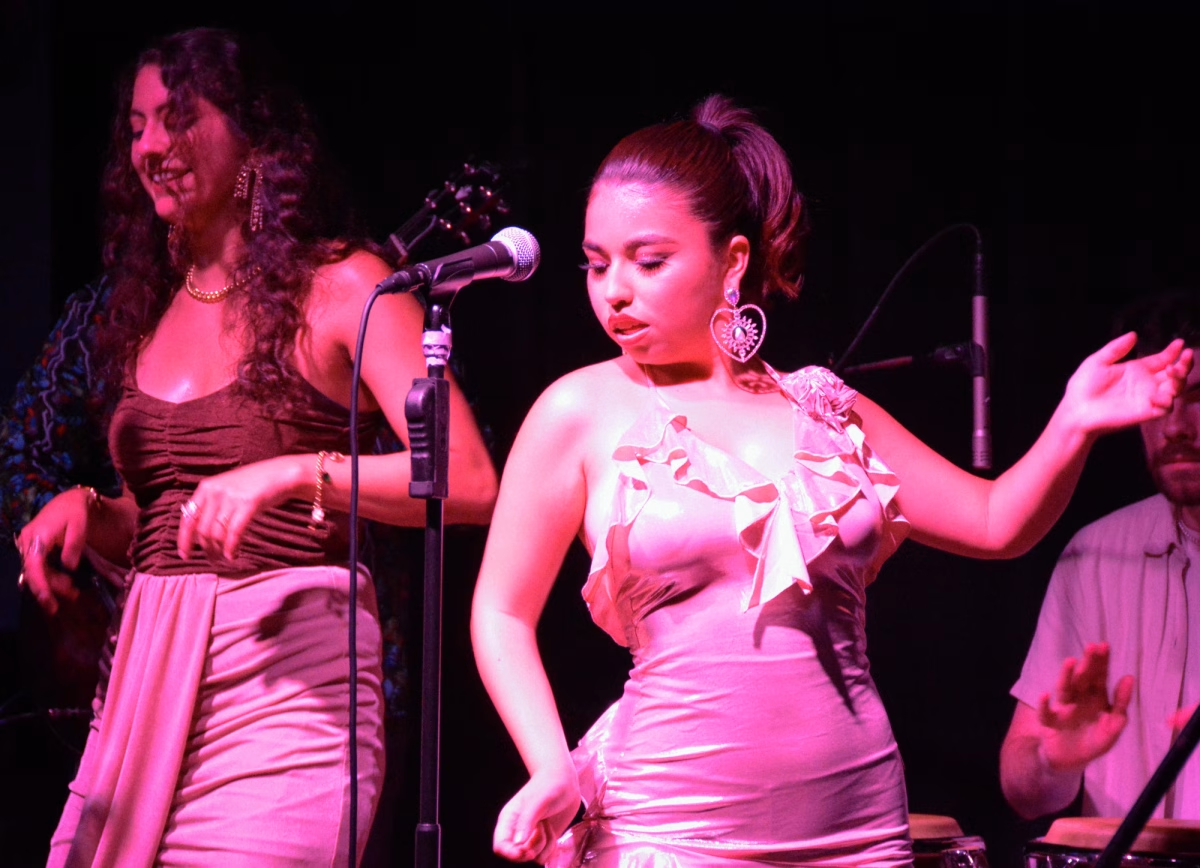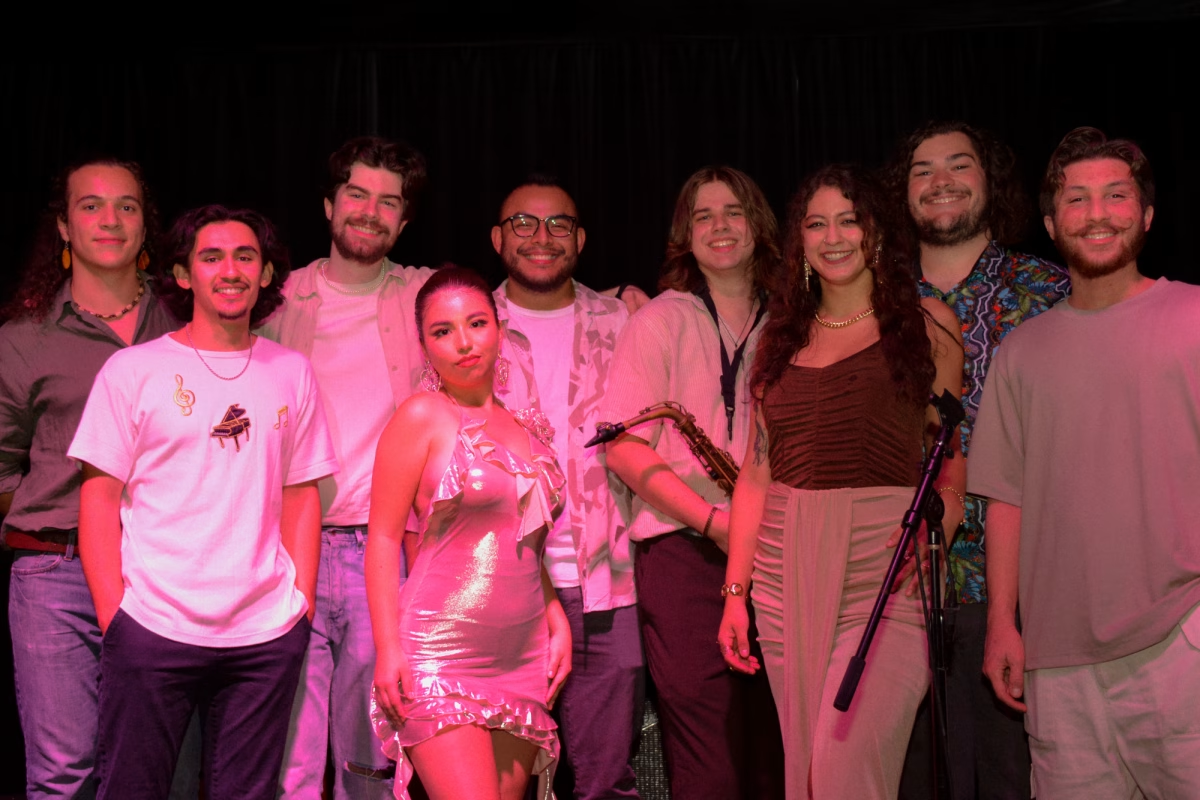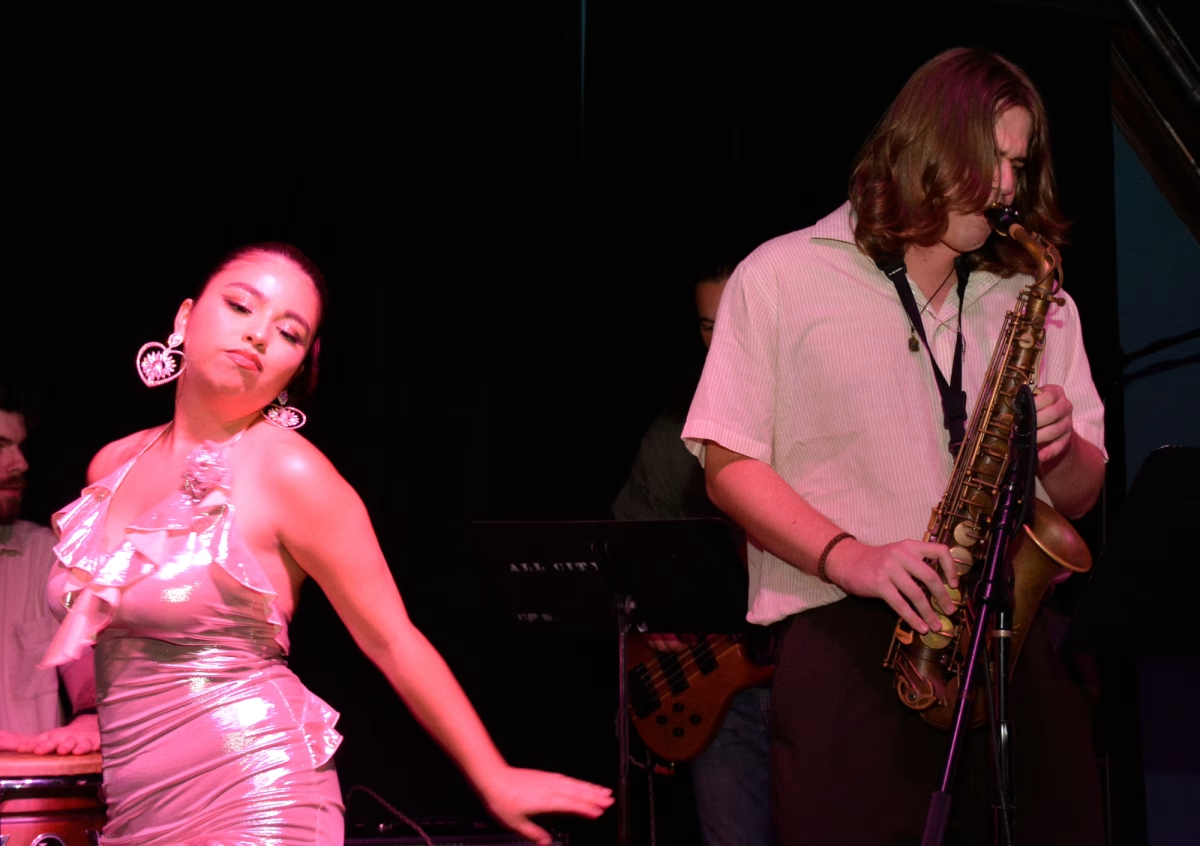Letting the rhythm take over her body, Nicole Nicolalde often finds herself jamming out to karaoke tracks and rehearsing salsa performances in her kitchen. For her, salsa isn’t just a rich mixture of Latin music, but a catalyst for fusion.
Nicolalde, a first-generation Ecuadorian singer born in Chicago’s Portage Park neighborhood, is a rising artist merging classic Latine music with modern sounds.
Her path to the stage took off when she and her band placed first in this year’s Biggest Mouth competition at Columbia College Chicago. The band went head-to-head with 12 other artists for a chance to win a cash prize, a performance at Manifest Arts Festival and press from local publications.
Since then, Nicolalde has been entertaining crowds through lively concerts, most recently at The Epiphany Center for the Arts on September 26.
Nicolalde’s family members are also musicians and always nurtured her musical talent, she said. They embraced Spanish-language performances and Ecuadorian culture. Although Spanish is her native tongue, she faced insecurities singing in Spanish around the predominantly English-speaking crowds she grew up with.
As Nicolalde explored different music styles, including musical theater, she became more comfortable singing in Spanish, she said.
“I felt like I wasn’t Ecuadorian enough or not American enough,” she said. “As I got older, I learned that that’s the unique part of it. I’m my own thing and it’s something new.”
As Nicolalde established her musical identity, she formed her own band while studying at Columbia College Chicago. The eight other members she met in college play a range of instruments from bongos and bass guitar to saxophone and trombone. Spanish is now integral to their performances, as the band plays songs in both English and Spanish.
“The lyricism in Spanish is just on a whole different level,” said Nicolalde. “It’s so [much] more expressive than English, poetic and beautiful. That’s what I fell in love with, especially artists like La India and Selena that are the main people I look up to.”
Salsa is central to Nicolalde’s musical style and she incorporates contemporary artists like Rosalia and Kali Uchis into song covers from older musicians like Celia Cruz.
The financial costs of forming large bands and nostalgia for classic salsa keep it from “growing” in the changing music scene, she said. Nicolalde seeks to revive the genre in a way that maintains its original essence while keeping up with the times.
“What we want to do is honor the roots, because the roots are so important,” Nicolalde said. “We also want to make it something new, something fresh. That’s the beauty of art. You can do whatever you want with it.”
Nicolalde and her band enjoy performing everything from the Jackson Five tracks and disco medleys of Selena songs, to tunes from Argentinian singer Nathy Peluso. Her most recent concert saw Latin jazz numbers and a remix of the Spanish singer Rosalia’s song “Despecha” made by one of her bandmates. The remix weaved merengue into the song’s Mambo-pop style.

Another influential part of Nicolalde’s approach to making music is welcoming non-Spanish speaking Latine people to her performances. She encourages them to enjoy the tunes without shame for not speaking the language. The “no sabo kid” trope, which pokes fun at Latine people who aren’t fluent in Spanish, can make them “feel left out,” she said.
“One thing I want to do with my music is be intentional with what’s going on vocal and instrumental wise,” she said. “They both come together and tell a story at the end of it. If we’re doing our job correctly, it doesn’t matter what language we’re singing it… you just have to feel it and interpret it the way you want to.”
Nicolalde uses both song and dance to tell stories on stage. She often choreographs her own salsa dances with her bandmates, throwing in choreography from Ariana Grande, she said. She loves how “soulful” salsa music is, prompting a natural inclination to move and dance.
“I kind of just let the music tell me what to do in the moment,” said Nicolalde. “I improv with the audience… and do dance breaks when everyone [her bandmates] are doing solos. That’s the best time to do it and go crazy.”
She also takes advantage of her background in musical theater to emote the narratives behind her song lyrics. Her first and upcoming original song, a salsa piece called “Aquella Noche” is heavily influenced by these theatrics, she said.
Though it’s still in the works, Nicolalde said its themes surround blossoming crushes and insecurities when navigating love.
While Nicolalde’s band has only been together for a year, she has big dreams for its future and plans on dabbling into songwriting.

Recognition is only a small part of the fulfillment she gets from making music; her biggest drive comes from the fun of creating art. Her goal is to travel abroad and share her salsa fusion with “everybody and anybody,” she said.
Nicolalde encourages other aspiring Latine artists to embrace their cultural heritage in their music. Networking with other Latine artists, learning about their experiences and fostering a non-competitive community are some of the many benefits of being a musician in Chicago, she said.
Through musical storytelling, Nicolalde hopes to inspire a new generation of artists and fans, while taking traditional Latine music to new heights. Her goal is to be a bridge between the past and present, inviting others to dance along with her.



